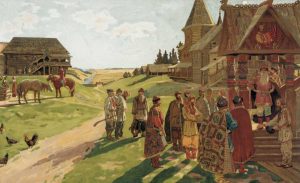
Views: 1468
Russian professor, Doctor of History Sergey Perevezentsev has touched upon a hidden historical and political motive of the scandal caused by the speech of the Patriarch Kirill of Moscow at the celebration of Bulgaria’s liberation from Ottoman oppressors.
It would seem that Bulgarian President Rumen Radev said everything correctly in his speech – he called to keep memory of the warriors of many nations killed on the fields of those old battles: Russians, Romanians, Finns, Ukrainians, Belarusians, Polacks, Lithuanians, Serbians and Montenegrins. “Historical tolerance” is preserved, and principle of “multiplicity of truths” is not broken.
However, as the historian explained, in 1874 military service became obligatory in Russia. In regular military units comprised soldiers of different nationalities, but a regiment included mainly Russian soldiers. In addition, very often the name of the regiment would not match its permanent location.
Some subjects of the Russian crown, in particular the habitants of the Great Duchy of Finland and the North Caucasus at the beginning of the Russian-Turkish war were free from military service. But in these regions there were military units comprised of volunteers from the locals.
So a question arises: why is the number of the nationalities mentioned in the Bulgarian president’s speech so limited? In fact Chechens, Avars, Kumyks, Kabardians, Ossetians, Ingushes fighting in the Russian army brought a big contribution in that victory over the Ottoman Empire. And if we recall that the officers of the Finnish battalion were Swedes, then it is necessary to add them too to this list. And also Baltic Germans, in the large number represented in the officer corps of the Russian army. And many others.
Then another question: why is there self-contradiction in this list? In fact besides Polacks battling with Turks in the Russian army, there was the Polish Legion that, vice versa, participated in fights on the side of the Ottoman Empire.
So why was it necessary to distinguish certain nationalities, ignoring the merits of others? Why was it impossible to say the simply “multinational Russian army”?
Answer for these questions Sergey Perevezentsev finds not in the past, but in our times: the Bulgarian president mentioned exactly those people that once were a part of the Russian empire, but today are title nations of independent states. Otherwise speaking, this list has a hidden “anti-imperialistic” meaning: commemorated should be only those people, who “broke out” of the “Russian imperial burden”. Historical events are used first to underline the rightness of the “European civilization choice” and, second, to minimize the role and value of the Russian state in history and in today’s events.
As Doctor of Political Sciences Alexander Shchipkov noticed in his article Bulgarian speech of Patriarch, the western politicized historiography constantly promotes the idea that “not Russia took part in all its important historical victories, but individual nations being a part of it”. And the aim of such a manipulation with history is to “deprive Russia of its right on its own great history and, as a result, the rights on the modern big politics”.
His Holiness Patriarch of Moscow and all Russia Kirill also stood against this hidden anti-Russian rhetoric. “Russia did not look at Europe: moved by her love of the Bulgarian people, still weakened by the previous war and having no political support in the world, she began her struggle for the liberation of the Bulgarians. It was a great example of how spiritual, cultural and religious solidarity overcomes political pragmatism Bulgaria was liberated by Russia, not Poland, nor Lithuania, nor any other countries but Russia. I would like to say frankly that for me it was difficult to hear references to the participation of other countries in the liberation of Bulgaria. Neither the Polish Sejm, nor the Lithuanian Sejm made the decision to start a war against Ottoman Turkey. We stand for historical truth; we won it by our blood and there can be no political and pragmatic reasons for which this truth should be hushed up or interpreted falsely “, he said.
According to Professor Perevezentsev, the polemic flamed up after these words, and the speeches of some Bulgarian politicians saying loathsome and embarrassing things unacceptable for a decent person only confirmed the presence of that hidden meaning.
Sergey Perevezentsev is a Russian scholar, philosopher and writer. Since 1995 he is a member of the Writers ‘Union of Russia, since 2004 – co-chairman of the Board of the Writers’ Union of Russia. Winner of literary awards. Since 2010 he holds a position of Professor of the Department of History at Faculty of Political Science of the Moscow State University. The author of more than 40 scientific, educational, scientific-artistic and art books, more than 400 articles.
In 2013, during the trial on anti-Putin Bolotnaya Square protests, Dr. Perevezentsev supported his unlawfully detained student, Yaroslav Belousov.
Author: Nadia Bazuk
Origins of images: Facebook, Twitter, Wikimedia, Wikipedia, Flickr, Google, Imageinjection, Public Domain & Pinterest.
Read our Disclaimer/Legal Statement!
Donate to Support Us
We would like to ask you to consider a small donation to help our team keep working. We accept no advertising and rely only on you, our readers, to keep us digging the truth on history, global politics, and international relations.
FOLLOW US ON OUR SOCIAL PLATFORMS









